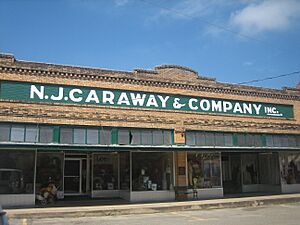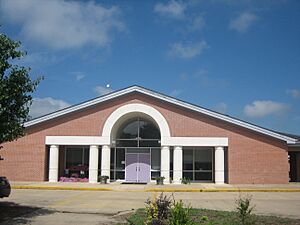Logansport, Louisiana facts for kids
Quick facts for kids
Logansport, Louisiana
|
|
|---|---|
|
Town
|
|
| Town of Logansport | |
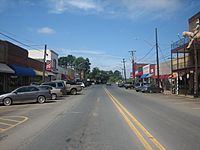
Downtown Logansport
|
|
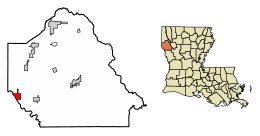
Location of Logansport in De Soto Parish, Louisiana.
|
|
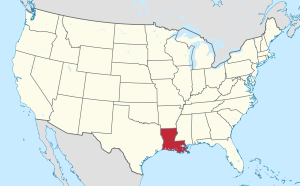
Location of Louisiana in the United States
|
|
| Country | United States |
| State | Louisiana |
| Parish | DeSoto |
| Area | |
| • Total | 3.50 sq mi (9.05 km2) |
| • Land | 3.40 sq mi (8.80 km2) |
| • Water | 0.10 sq mi (0.26 km2) |
| Elevation | 213 ft (65 m) |
| Population
(2020)
|
|
| • Total | 1,340 |
| • Density | 394.58/sq mi (152.34/km2) |
| Time zone | UTC-6 (CST) |
| • Summer (DST) | UTC-5 (CDT) |
| Zip Code |
71049
|
| Area code(s) | 318 |
| FIPS code | 22-45040 |
Logansport is a small town in western DeSoto Parish, Louisiana. It is located right next to the Sabine River, which forms part of the border with Texas. In 2020, about 1,340 people lived there. Logansport is part of the larger Shreveport–Bossier City area.
Contents
History of Logansport
Early Days and the Sabine River Boundary
For a long time, the area where Logansport is located was a disputed borderland. Even after the United States bought Louisiana in 1803, the exact boundary was unclear. In 1806, an agreement was made to create a "neutral territory" where neither side would claim full control.
In 1819, a treaty called the Adams–Onís Treaty tried to solve the border issue. It said the Sabine River would be the boundary. However, Mexico became independent in 1821, and the border argument started again.
Around 1830, a doctor named Logan moved to the area. He started a ferry business across the river, and the place became known as Logan's Ferry.
Texas Independence and the Border Marker
In 1836, Texas won its independence and became the Republic of Texas. Texas agreed that the Sabine River would be the international border. Surveyors began marking the boundary in 1840. They placed special markers along the river. One of these markers was placed in Logansport. This marker is believed to be the only original international boundary marker still existing in the United States! In 1845, Texas joined the United States, and the Sabine River was no longer an international border.
Growth of the Town
The town officially got the name Logansport when a post office opened there on February 28, 1848. Not many people lived in Logansport until the railroad arrived. The railroad brought new people, including some who were looking for adventure.
Logansport began to grow and was officially made a town. The first election for town leaders happened on June 25, 1887. Only 15 people were eligible to vote back then! Elijah Price was chosen as the first mayor. In its early days, finding oil and natural gas nearby also helped the town's economy.
Geography and Location
Logansport is located at 31°58′29″N 93°59′51″W / 31.97472°N 93.99750°W. The town covers about 3.4 square miles (9.05 square kilometers). Most of this area is land, with a small part being water, mainly from the Sabine River.
The riverfront area in Logansport is a welcoming spot for people entering Louisiana from Texas on U.S. Highway 84. It has nice walking paths, a gazebo, and picnic tables. There is also a special memorial dedicated to veterans.
Population and People
How Many People Live Here?
The United States Census Bureau counts how many people live in towns across the country every ten years. In 2020, the population of Logansport was 1,340 people.
Here's how the population has changed over the years:
| Historical population | |||
|---|---|---|---|
| Census | Pop. | %± | |
| 1890 | 281 | — | |
| 1900 | 688 | 144.8% | |
| 1910 | 420 | −39.0% | |
| 1920 | 632 | 50.5% | |
| 1930 | 1,040 | 64.6% | |
| 1940 | 1,222 | 17.5% | |
| 1950 | 1,270 | 3.9% | |
| 1960 | 1,371 | 8.0% | |
| 1970 | 1,330 | −3.0% | |
| 1980 | 1,565 | 17.7% | |
| 1990 | 1,390 | −11.2% | |
| 2000 | 1,630 | 17.3% | |
| 2010 | 1,555 | −4.6% | |
| 2020 | 1,340 | −13.8% | |
| U.S. Decennial Census | |||
Who Lives in Logansport?
The 2020 census also looked at the different groups of people living in Logansport. There were 1,340 people, living in 684 households, which included 481 families.
Here is a breakdown of the racial groups in Logansport as of 2020:
| Race | Number | Percentage |
|---|---|---|
| White (not Hispanic) | 708 | 52.84% |
| Black or African American (not Hispanic) | 536 | 40.0% |
| Native American | 5 | 0.37% |
| Asian | 1 | 0.07% |
| Other/Mixed | 63 | 4.7% |
| Hispanic or Latino | 27 | 2.01% |
Local News and Media
Logansport used to have its own newspaper called the Toledo Bend Tribune, but it closed in 2007. Now, there isn't a local newspaper just for the town.
However, there is a popular online and printed magazine called DeSoto Life. This magazine comes out every three months and covers news and stories from all over DeSoto Parish, which includes Logansport.
A weekly newspaper from Center, Texas, called The Light and Champion, also started giving out a free paper called The Merchandiser in Logansport in 2017. Their website also has a special section just for Logansport news.
| Name | Serve |
|---|---|
| Town of Logansport newspaper | Town of Logansport |
Famous Folks from Logansport
Many interesting people have connections to Logansport:
- Louis "Moses" Rose was a French soldier. He is known for being the only person who left the defenders of the Alamo before the final battle. He later settled in Logansport and is buried there.
- Larry Bagley is a Republican politician. He represents District 7, which includes Logansport, in the Louisiana House of Representatives.
- John Spencer Hardy was born in Logansport. He became a lieutenant general during World War II and led the United States Army Air Corps in the Mediterranean Sea. He spent his later years living in Shreveport.
- Elzadie Robinson was a classic female blues singer. She was born in Logansport, likely in 1897 or 1900.
- Country blues musician Ramblin' Thomas was also born in Logansport.
- Blues musician Jesse Thomas was Ramblin' Thomas's brother and was also born in Logansport.
- Bryan Martin is a country music singer.
See also
 In Spanish: Logansport (Luisiana) para niños
In Spanish: Logansport (Luisiana) para niños
 | Claudette Colvin |
 | Myrlie Evers-Williams |
 | Alberta Odell Jones |


